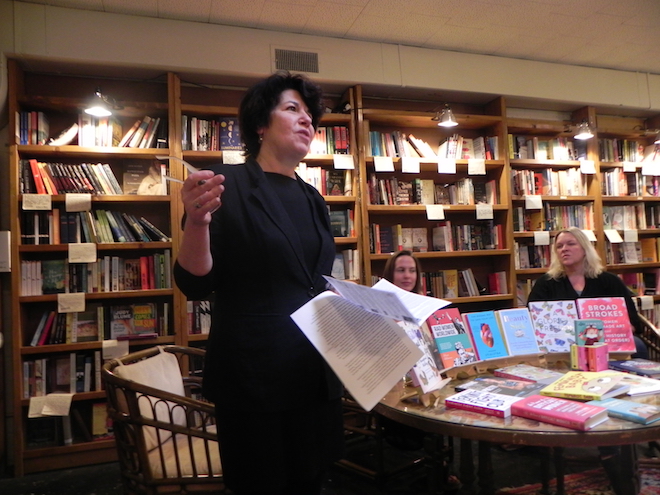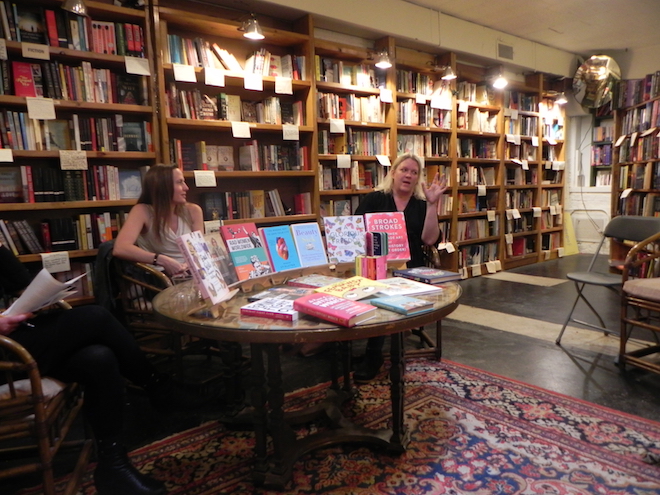Figures like Maya Angelou, Frida Kahlo, Marie Curie and Malala Yousafzai don’t usually grace the pages of children’s books, but they light up the pages of Little Feminist Board Book Set. With a book each dedicated to female artists, leaders, activists and pioneers and phrases like “Marie Curie experimented and proved that girls are brilliant” and “Sally Ride explored space and showed that girls shine bright,” this book and other books like it are the result Bookends & Beginnings owner Nina Barrett dubbed a "sudden burst of feminist publishing."
To discuss the recent rise in feminist literature more in-depth, Barrett moderated a conversation at the store Thurdsday with Northwestern psychology professor Renee Engeln and author Megan Stielstra, as a part of Evanston's 2018 Literary Festival.
A primary focus of the discussion centered around body image. Engeln recently authored Beauty Sick: How the Cultural Obsession with Appearance Hurts Girls and Women, and now directs Northwestern's Body and Media Lab, and Barrett has had personal experiences with body struggles. Barrett opened by discussing the contrast she ran into during her teenage years between believing she “could do anything," but also knowing that she would have to compete with her own body first.
“I also knew that I had to go on a diet first because I understood that if I was going to do all of those things and be super successful in my career, I was going to to need to look like all of the hot women I saw in magazines, on T.V. and in moveis so that somebody would fall in love with me,” Barrett said, “ I actually had an early bout with anorexia before anyone was talking about anorexia or knew what it was. I went through that for a couple of years...Nobody talked about it then.”
Engeln said that through her research, she has also run into students who are concerned with physical appearance in regards to their age. For example, Engeln talked to a 22-year-old student last quarter who wanted to know what to do because she was “afraid of getting old.”
“There’s about nothing that makes me angrier than seeing someone who’s just on the cusp of awesomeness — because you totally are, all of you students — feeling already afraid about moving on in life, about gaining wisdom, about gaining life experience, because it’s going to come with wrinkles and cellulite and grey hair,” Engeln said.
SESP sophomore Kyra Ramsey thought the event's discussion of being the best version of yourself was particularly valuable.
“It made me think more deeply about issues that are so common,” Ramsey said. “I really liked what Renee said about how it’s preached to be yourself, but she said to be the best version of yourself, like don’t be an asshole. And also how you can’t be expected to be yourself when you’re a product of your environment, and you can’t change that.”
Barrett said that President Trump is also a reason behind the sudden spike in feminist literature. Barrett and Engeln said that Trump had turned back time, in a sense, as he once again brings questions like “Can we treat women as sex objects in the workplace?” to the table, even though society thought it had resolved those issues a while ago.
“I think that there’s an issue about being believed,” Engeln said. “Things that have been going on for a long time that people sort of knew about, now, suddenly we’re having mainstream conversations about them, like, ‘Was this actually happening to women?’, ‘Were things happening in the workplace?’, ‘Were women still feeling this way about their body?”
Stielstra, author of Everyone Remain Calm, Once I was Cool, and The Wrong Way to Save Your Life spoke about the representation of women in the publishing industry. She said that while 80 percent of publishing includes women in editorial and staff roles, women of color are still drastically underrepresented in the field.
“We’ve got to break that data up through an intersectional lens because still that 80 percent is whiteness," Stielstra said. "We need more people of color, we need more queer and trans people to fill those roles.”
Engeln, however, pointed out the potential ramifications of women overtaking previously male-dominated fields, like the publishing industry.
“What happens is that these fields become systematically less valued, they start to pay less, they start to be seen as less prestigious. So, yes, there are more women in publishing, but publishing is also under fire,” Engeln said.
Engeln also emphasized the need for structural change, particularly in light of the recent #MeToo movement. She said that while speaking out is an important first step, it's important to keep the conversation going.
“Speaking out feels powerful, but it doesn’t change anything unless structures change,” Engeln said. “Speaking out is important, that’s something that I value and that I want young people to value, but I also feel like we forget sometimes that it is not enough.”

